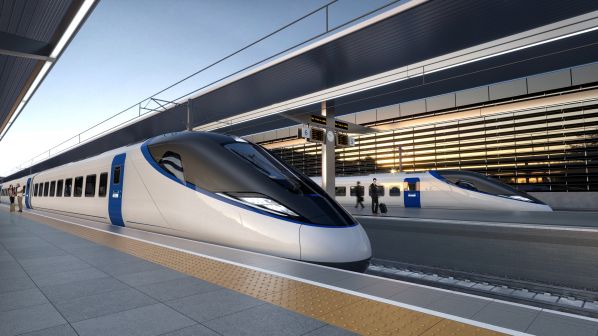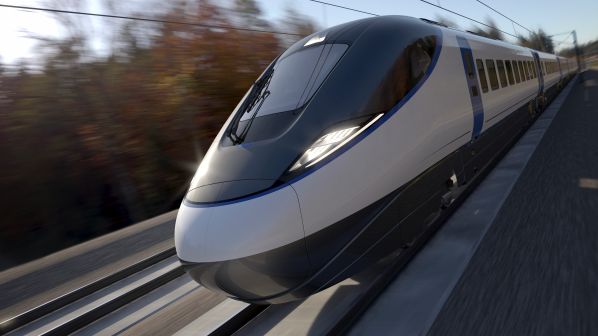THE Alstom-Hitachi joint venture has been selected by Britain’s Department for Transport (DfT) for a contract worth £1.97bn to supply a fleet of 54 eight-car, 360km/h high-speed trains for use on High Speed 2 (HS2) and the conventional mainline network.
The new trains will be entirely built in Britain. The first stages of production including assembly of the 432 vehicle bodies and initial fit out will take place at Hitachi Rail’s Newton Aycliffe plant in northeast England. The second stage of fit out including interiors, all electrical systems, and bogies will take place at Alstom’s Litchurch Lane plant in Derby. Alstom will also assemble and maintain the bogies at its facility in Crewe.
Manufacturing will commence in 2025 and the first trains are set to be rolled out in 2027, ahead of introduction into service between 2029 and 2033. The two companies will directly employ 505 people in the Midlands and North in the design and manufacturing phase, including 49 apprentices and graduates. A further 2000 jobs will be created elsewhere in the British supply chain.
IRJ understands that the final two bidders for the rolling stock contract were the Alstom-Hitachi joint venture and Siemens. The German manufacturer launched a legal challenge against HS2 Ltd earlier this year, and the date for that case to be heard is understood to be November 2022.
“We’re obviously very disappointed by the announcement as we believe we submitted a strong bid to build Britain’s new HS2 trains,” a Siemens spokesperson told IRJ.
Spanish manufacturers CAF and Talgo had also both launched legal challenges during the procurement process.
Hitachi’s joint venture bid was originally with Bombardier, with Alstom bidding separately. When Alstom purchased Bombardier, it is understood but not confirmed, that the separate bid was dropped when the rebranding process began.

Maintenance
In addition to design, manufacturing and testing, the contracts include 12 years of maintenance, which could be extended to cover the estimated 35-year life of the fleet. The trains will be maintained at a new depot that HS2 is constructing at Washwood Heath on the outskirts of Birmingham, where 100 jobs will be created. Alstom’s service centre in Crewe will also become a strategic base for heavy maintenance activity on a “significant proportion” of the train’s key components and systems.
The roughly 200m-long trains will be designed to be fully accessible and the interior layout will be decided following a two-and-a-half year collaborative design process involving HS2 Ltd, the DfT, and the West Coast Partnership, the operator of the trains when they enter service. The trains will be able to run in multiple, offering 1100 seats per double set.
As well as Phase 1 of the HS2 network from London to Birmingham, the trains will operate on the conventional mainline network, serving destinations such as Stoke, Crewe, Manchester, Liverpool, Carlisle and Glasgow. The British government confirmed that it would scale back plans for the eastern leg of HS2 from Birmingham to Leeds when announcing details of the Integrated Rail Plan last month.
HS2 Ltd says the trains are set to be 15% lighter and offer 30% more seats than comparable European high-speed trains, such as the ETR 1000 built by the Hitachi-Alstom joint venture for Trenitalia and Spanish operator, Ilsa. The manufacturers say the trains will be one of the world’s most energy efficient high-speed trains.
The trains will feature sensors capable of detecting potential faults and support a predictive maintenance regime. They will also be equipped with high-capacity passenger Wi-Fi, digital seat reservations, and journey information delivered through multiple channels.
Both Hitachi and Alstom, which have an equal share of the contract, are making new multi-million-pound investments in their British manufacturing facilities to support the contract. Hitachi recently invested £8.5m in bespoke welding and painting facilities at Newton Aycliffe. Alstom is also set to introduce a new manufacturing line at Derby for the trains and invest in Crewe to support bogie manufacturing, the first time in 17 years the manufacturer has produced this component in Britain. The manufacturers have also committed to £5m in research and development spending with British universities while the contract will provide a launchpad for new investment in education, building on partnerships with local schools.
“Today is a massive day for HS2,” says HS2 Ltd CEO, Mr Mark Thurston. “The trains that will be built in Derby, Newton Aycliffe and Crewe will transform rail travel - offering passengers unparalleled levels of reliability, speed and comfort and help in the fight against climate change. I’d like to congratulate Alstom and Hitachi and I look forward to working with them as together we bring these exciting new trains to passengers across the UK.”
This is an evolving story. More response from the industry will follow.
For detailed data on high-speed fleet orders from around the world, subscribe to IRJ Pro.

